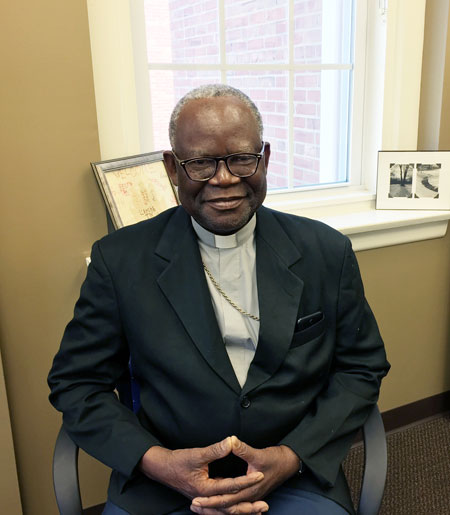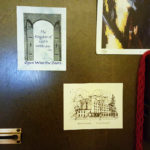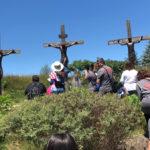By Barb Arland-Fye
The Catholic Messenger
A Nigerian bishop who visited the Diocese of Davenport this past summer said the diocese he serves in the center of Nigeria largely experiences peaceful coexistence among religions. His experience differs from that of Catholics and other Christians living in northern Nigeria.
Bishop Martin Olorunmolu, who leads the Diocese of Lokoja, spent time in Iowa and Minnesota from mid-July to mid-August on his first visit to the United States. He took the opportunity to visit two of his priests serving in the U.S. One of them, Father Nicholas Akindele, serves as parochial vicar at St. John Vianney Parish in Bettendorf. In addition, he works in the Diocese of Davenport’s Tribunal as defender of the bond and episcopal delegate for matrimonial matters. He also is pursuing a doctorate degree in canon law, which brought him to the United States.

Bishop Martin Olorunmolu of the Diocese of Lokoja, Nigeria, visited the Diocese of Davenport this past summer.
Bishop Martin, 71, and Father Nicholas, 48, spoke with The Catholic Messenger about Catholicism in the Diocese of Lokoja, and the opportunities and challenges that the people experience. Nigeria, the largest country in Africa by population, has 55 dioceses. The Diocese of Lokoja has a Catholic population of about 40,000 out of a total population of approximately 2 million people, Bishop Martin said. About 50 percent of the population is Christian and the other 50 percent is Muslim or traditional religions.
“In general, there is religious harmony,” Bishop Martin said. “A peaceful coexistence of our religions. The far north in Nigeria is far different.”
Aid to the Church in Need reports that “Islamist violence is putting huge pressure on Christians” in several African countries, including Nigeria. More than 3,700 Christians reportedly lost their lives in 2018 as Islamist militants continue “a reign of terror against Christians and Muslims alike,” the papal foundation said (Catholic News Service, 10-28-19).
“Our diocese suffers indirectly from the religious turbulence in the north as many people move away from such areas. This places a strain on social amenities. Unemployment also bites harder,” Father Nicholas said.
Bishop Martin chose to focus the interview on his home diocese and his experiences in the Diocese of Davenport. While here, Bishop Martin presided at Mass at Our Lady of Lourdes Catholic Church in Bettendorf and concelebrated Mass at St. Mary Catholic Church in Wilton and St. John Vianney Catholic Church in Bettendorf. He concelebrated daily Mass at St. John Vianney with Father Nicholas and presided at a daily Mass when the pastor, Father Jim Vrba, and his staff made a staff retreat.
Bishop Martin also met with Bishop Thomas Zinkula, who now serves on the U.S. Conference of Catholic Bishops’ Subcommittee on the Church in Africa. Later, they shared a meal together at diocesan headquarters that African priests studying in the diocese prepared.
Bishop Martin “is very appreciative of Bishop Zinkula, who also made it possible for a mission appeal in several parishes,” Father Nicholas said. “That goes a long way in helping with his pastoral ministry back home.”
The Nigerian bishop recalled the homily he gave at the Wilton church based on the hospitality of Abraham. “I emphasized the virtue of hospitality based on generosity,” the bishop said. “When we practice hospitality in a generous spirit, we will be showing hospitality to God. God has been generous to us.”
The people of his diocese recognize that generosity. “The church is always full. The only problem is material poverty,” he said. People work together because they want to maintain the ministry they receive. The Diocese of Lokoja has 67 priests. Thirty seminarians are discerning the priesthood in major seminary; many more attend minor seminary.
“Young people are coming forward to be trained as priests but we lack the money to train them and, once ordained, to keep them trained properly,” the bishop said. Priests in Nigeria live on charity and an allowance, which the faithful provide. “Yet it is still difficult for parishes to support and provide sustenance to the priests in the parish,” Father Nicholas said.
Asked to identify major concerns of Catholics in the diocese, Bishop Martin said, “the political life.” Many people “suffer from bad government. This is a concern, and corruption on society.” Father Nicholas tells of “civil servants who work and don’t get paid, pensioners who don’t get their pensions in time. It fosters corruption. When people aren’t sure they will receive just compensation, the results are bad government.”
The majority of educated people work as civil servants or as teachers. Many others work as petty farmers, producing food for themselves – yam, corn and cassava. Women work in petty trading, selling clothing, food and other items, Father Nicholas said.
Among the church’s concerns, he said, is a desire to assist women and youths in becoming skilled labors such as clothing makers, event planners, computer repairers, and more. The parish that Father Nicholas previously served in his home diocese provided a technical training center for people to develop employment skills. “We look forward to setting up more centers to reduce unemployment for youths and women. This helps with the holistic faith formation of our parishioners,” he said.
Bishop Martin wants Father Nicholas to remain in the United States as long as necessary to advance his education and other skills that will benefit the people of his home diocese.
“The PhD is of value to me and to the diocese,” Father Nicholas said. However, “my ministry and work with God’s people takes priority – that will serve my diocese.”
Father Nicholas sees Bishop Martin as a role model. “He is in touch with his people. He visits them on a one-on-one basis and cares sincerely for the flock that he is responsible for.… He brought Vatican II to life. He is a bishop who consults with his priests; he consults with his people.” Ministry that fosters peace and unity, and leaves no room for violence.











